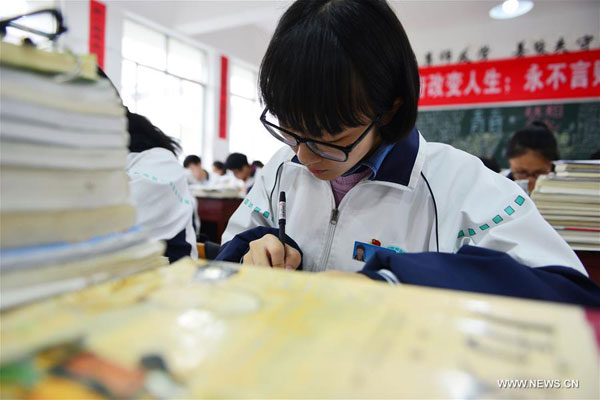True value of exams is not in the score
 |
|
A student studies in a classroom of Minzu High School in Jianhe county, Southwest China's Guizhou province. [Photo/Xinhua] |
As usual, the performance of their children in the final exams has dominated the emotions of their parents ahead of Spring Festival. The family atmosphere, parent-child relationship, consumption and even the kids' food are all closely related to their scores.
But do parents really see the value of exam scores and the role of exams?
First, exam results reveal a child's academic progress.
For primary and secondary school students, interest and confidence in learning are more important than the test results. For children whose test results are less glamorous, the examination has proved their defeat. But no matter if their children achieve good scores or not, their parents should cherish their children's hard work and study efforts.
In fact, children need their parents' love. Parents shouldn't make any derogatory remarks, or show an angry or disappointed face to their children. Instead, they should focus on any progress their child has made. Maybe in a certain subject the result is better than before, or the study attitude has improved a lot?
In short, parents should focus on the best aspects of their child's performance, pulling children out from under the pressure of the exams and giving them confidence in learning.
Second, parents need to bear in mind that exams are a way to find the weaknesses in a child's learning process.
There is a variety of test classifications; in general, they can be divided into targeted and selective examinations. Selective examinations refer to examinations, such as the college entrance examination, used to identify talent. The middle and final examinations in primary and secondary school years are to check whether the knowledge and skills acquired by students after one semester of study have been obtained according to the requirements of the syllabus and whether they have reached the established teaching objectives. These are phased academic examinations which are targeted tests. Of course, in order to encourage students to learn, schools offer some incentives based on the results of these examinations as the basis for selection, such as awards to the students who gain the highest scores.
The targeted examinations present a child's learning outcome at a certain stage. Therefore, related to the results, the problems found in these tests should be valued by parents. Through these exams, a child's learning weaknesses, which may affect their future studies, can be identified.
Learning is a continuous process. The previous stage of learning will influence the next stage. Therefore, if the parents only focus on their children's lowest scores, and only feel sad or disappointed and vent their emotions by making life difficult for their children, targeted examinations lose their true purpose.
Third, identify a child's strengths and fully develop them.
Parents should talk with their children as well about their study experiences: why they like one course more than another, what learning methods they prefer, which subjects their children are interested in. It is unnecessary to force children to develop any skills they are not interested in at all. If there is genuine talent and interest in a particular area, parents should try and help their children tap and develop their potential.
Parents' perception of children's exam scores reflects their understanding of different stages of development, thus the exams are also exams for parents now.
The author is director of the Family Research Center at the China Youth and Children Research Center.
- Students repay test score 'loans' at a Nanjing school
- One million students sit national civil service exam
- National civil service exam poses up-to-date questions
- Education system in spotlight after exam scandal
- Bonus points for exam must not be misused
- Parents and students on exam day
- Exam puts too much pressure on students



















